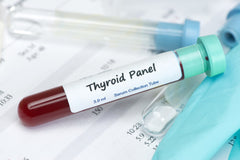
By Frank O. McGehee, Jr., M.D., C.C.N.
Forever Health Network Practitioner
Let's take a short quiz to see if you might have an issue with your thyroid … the master gland.
- Is the outside third of your eyebrow thinning or non-existent?
- Are your nails thin and brittle?
- Do your feet and hands seem cold all the time? Conversely, are you severely intolerant to heat?
- Is it almost impossible to lose weight, no matter how hard you exercise and watch your diet?
- Do you feel sluggish throughout the day even after a good night's sleep?
- Is your hair thinning or balding?
- Do you have slow speech, movements, low blood pressure, hoarseness or a slow heart rate?
- Do you have increased cholesterol levels?
- If you take your underarm temperature before getting out of bed, is it below 97.6 degrees?
- Are you pre- or post-menopausal?
If you answered yes to several of these questions, you certainly could have a low thyroid issue and should have your thyroid levels checked by a simple and inexpensive thyroid blood panel.
The blood values included should be total T3, the active form of thyroid; total T4, the reserve thyroid; and TSH, thyroid stimulating hormone. In order to make a correct diagnosis, T3, T4, and TSH must be tested.
Low levels of T3 and T4 indicate a need for thyroid replacement. Sometimes, the thyroid dose you are taking has not been given in sufficient dosage, or if you're on Synthroid, the body sometimes cannot convert T4 to active T3.
Thyroid stimulating hormone (TSH) values are different from T3 and T4 in that a high TSH means thyroid replacement is needed. (Low T3 and T4 are the indications thyroid replacement is necessary.) A study of 25,000 participants has argued that the ideal TSH level is 1.4 or less, not the upper limit of 5.5 still cited by some laboratories.
Role of the Thyroid
The thyroid is a butterfly-shaped organ located just below the Adam's apple in the neck. Made up of small sacs, this gland is filled with an iodine-rich protein called thyroglobulin along with the thyroid hormones thyroxine (T4) and small amounts of triiodothyronine (T3).
The primary function of these two hormones is to regulate metabolism by controlling the rate at which the body converts oxygen and calories to energy. In fact, the metabolic rate of every cell in the body is regulated by thyroid hormones, primarily T3.1
In healthy individuals the gland is imperceptible to the touch. A visibly enlarged thyroid gland is referred to as a goiter. Historically, a goiter was most frequently caused by a lack of dietary iodine.2 However, in countries where salt is iodized, a goiter as a result of iodine deficiency is rare.
Treat the Symptoms NOT the Lab Values
Many patients are denied thyroid replacement by their physicians because the physicians only prescribe thyroid medication if thyroid values fall outside the "expected or lab range." For TSH, that level is 5.5.
Some physicians feel fearful prescribing any thyroid even if values are outside of "the norm." The fear often originates from past censure by their local medical boards. This was the routine practice 20 years ago. Today, most patients are given Synthroid, a prescription drug, and anti-depressants for their symptoms.
Lab ranges were originally designed to identify a disease in process for the physician. These values are decades old, and our bodies, needs, and lifestyles have changed greatly since then. Unfortunately, by the time a patient falls outside the "expected range," full-blown disease is already in process.
Nutritionists, however, designate an optimal number as desirable for all lab values. Variance either way from the optimal value allows for treatment of a deficiency to begin before it becomes a disease.
Treating Low Thyroid
Most physicians today prescribe a drug called Synthroid, which is T4 only. It is synthetic, or made in a laboratory, and the body cannot assimilate the chemical. Pharmaceutical Synthroid is only 78% bio-identical.
Imagine trying to open a locked door with a key that is 78% keyed to the lock! Most of the time T3 should be included in thyroid replacement, along with T4. In a few cases T4 alone is called for, and this is an extremely rare situation.
Physicians are really not well-informed by drug company representatives or continuing medical education about a choice in prescription medication for hypothyroidism. Drug companies market Synthroid to physicians as if it were the only remedy to treat hypothyroid conditions.
There are other choices for thyroid replacement. Many of these "alternative" prescriptions provide both T3 and T4. Usually, you'd have to have a compounding pharmacy prepare the formulation — an extra step of care that's well worth it.
What You Need to Know
Millions of Americans suffer from fatigue, weight gain, depression, and cognitive impairment. Many believe that they have no choice but to accept these seemingly "age-related" declines in their quality of life.
Underactive thyroid (hypothyroidism) is often overlooked or misdiagnosed and can be the underlying cause of these symptoms. So, bottom line: Get your thyroid tested!
References
- Front Biosci. 2007 Jan 1;12:1220-8.
- Thyroid. 2007 Sep;17(9):823-7.
